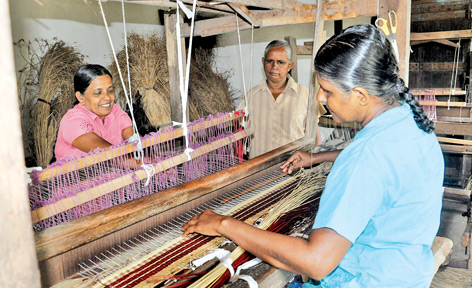SMEs, the key for economic growth
by Gamini Warushamana
 SMEs can play a big role in helping developing countries achieve high
economic growth and create job opportunities, Practice Manager, Asia
Trade and Competitiveness Global Practice of World Bank Group, Dr. P.S.
Srinivas told the SME forum organised by the Ceylon Chamber of Commerce
recently. SMEs can play a big role in helping developing countries achieve high
economic growth and create job opportunities, Practice Manager, Asia
Trade and Competitiveness Global Practice of World Bank Group, Dr. P.S.
Srinivas told the SME forum organised by the Ceylon Chamber of Commerce
recently.
Dr. Sirinivas made a presentation on 'Role of SMEs in economic
development; international perspectives and experience'.
Excerpts from his speech.
"Around 99.8 percent of enterprises in developing countries are SMEs
and they account 24 percent of exports, 80 percent of all jobs and 37
percent of GDP.
In the next 15 years, 600 million new jobs will be needed to absorb
new entrants and at present over 200 million people are unemployed
globally.
SMEs are important for the creation of formal and informal jobs.
Today, around 50 percent of all formal jobs in developing countries are
in small firms and SMEs provide two-thirds of formal jobs. The
importance of SMEs for job creation is greater in low income countries.
Globally, SMEs create 86 percent of new formal jobs and the number rises
to 95 percent in low income countries.
Constraints
SMEs that are over 10 years, provide almost 25 percent of the jobs.
An extra 60 percent of the jobs are in the informal sector which is
mostly in micro enterprises. However, there are some small firms that
could grow if constraints they face are solved.
The informal sector correlates with low productivity and poverty.
Many large firms employ highly educated professional staff which may not
create opportunities across society.
But SMEs provide a path to prosperity for unemployed people through
informal employment or
underemployment.
At the same time, most SMEs face an uneven playing field which stunts
their potential to grow.
Therefore, helping SMEs to improve productivity and create more jobs
is key in eliminating poverty and reducing inequality. They should be
provided the right enabling environment.
The composition of the SME sector changes as the income of a country
rises. As country income levels increase, informality in the SME sector
declines.
SMEs are predominantly involved in low value-addition activities
across a large selection of industries.
Labour productivity in the SME sector is low. Growth is higher in the
competitive sectors because competition encourages firms to innovate and
renew technologies.
 Promotion of entrepreneurship can create new firms and evidence
suggests that relatively new firms are more productive and create more
new jobs compared to older SMEs. Promotion of entrepreneurship can create new firms and evidence
suggests that relatively new firms are more productive and create more
new jobs compared to older SMEs.
Evidence in Colombia confirms that newer firms create more jobs
irrespective of size. According to findings in Indonesia, start-up
companies are more productive compared to incumbent SMEs.
All over the world, SMEs face different constraints compared to large
firms. They suffer more than large firms from weaknesses in the
investment climate, lack of access to finance and lack of leverage with
the government.
Many governments support SME sector growth by various incentives,
such as financial, subsidies, tax concessions, setting up SME-specific
bank branches and input subsidies.
Too many programs, implementing agencies, inadequate or no monitoring
and evaluation, limited adaptation of programs based on evidence are the
issues that make the incentives less productive.
Several questions arise regarding the measures. Can we do it in a
better way and how? Lack of
monitoring and evaluation processes on the effectiveness of the
policies is an issue.
The alternative approach proposed include better monitoring and
evaluation systems, taking a strategic, comprehensive and demand-driven
approach and being ready to change and adopt.
Small firms
In the alternative approach, the focus is on addressing market
imperfections, market failures and information asymmetries to help SMEs
to create markets.
Avoid having 'permanent' programs and reducing fiscal burden caused
by ineffective programs are also important. SME development strategy
should be about facilitating entrepreneurship and enabling small firms
to grow.
The Government's SME strategy should be evidence-based with a strong
built-in monitoring and evaluation component and it should also be
flexible as realities change after the outcomes are evaluated.
Only a handful of high impact programs and platforms are needed and
each should be led by a single agency that should coordinate with the
others.
There are several causes for market failure of SMEs. High transaction
cost due to their small size is one. This is a key cause of bank and
corporate reluctance to work with SMEs. Identifying efficient ways of
transacting with SMEs is critical to level the playing field for SMEs.
 Due to lack of information, SMEs are less likely to have transparent
information on past performance and present operations, which increases
the perception of riskiness. SMEs need solutions that increase
transparency, governance and data through partnerships and technology. Due to lack of information, SMEs are less likely to have transparent
information on past performance and present operations, which increases
the perception of riskiness. SMEs need solutions that increase
transparency, governance and data through partnerships and technology.
Alternatives
SMEs are typically too small to have a high level of specialisation
in operations or management and innovations in the SME sector are also
limited. Therefore, SMEs need more efficient access to skills,
technology and markets that are relevant to the specific needs of the
business and sector.
Inefficient markets is another reason for market failure of SMEs.
Banks and corporates have alternatives to working with SMEs where there
is not much competition and so rents can be high. Identifying
opportunities and demonstrating success in the SME space can help
markets respond better to SME opportunities.
There are two alternative approaches for SME development, the life
cycle approach and ecosystem approach. Globally, SME needs are largely
influenced by the stage of development in its life cycle. The needs of
the SMEs are different at each stage.
For instance, at the seed level where the SME is only a thought or
idea, the need is motivation to start the new enterprise. At the
start-up stage where SMEs exist legally the needs are seed funding, ease
of entity registration and related licensing, product incubation and
commercialisation support.
At the growth stage it needs support for market knowledge, global and
local market access, marketing and promotion, ease of regulation and
talent acquisition. At the stability stage, it needs cost structure
optimisation, new product development and product adaptation and market
knowledge.
The ecosystem approach considers infrastructure development, enabling
environment, access to finance and access to market." |

